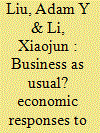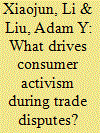| Srl | Item |
| 1 |
ID:
192150


|
|
|
|
|
| Summary/Abstract |
China’s historic 20th Party Congress in 2022 was principally noteworthy because Xi Jinping successfully secured a third term, but Beijing also tellingly postponed releasing GDP and other key economic statistics during the Congress. This deliberate obfuscation could not conceal that the Chinese economy has been in trouble for quite a while now. Media stories in recent years have increasingly reported on Chinese home buyers refusing to pay mortgages,Footnote1 depositors lining up to retrieve savings,Footnote2 central authorities cracking down on large private firms,Footnote3 and local governments becoming constrained by debt and shrinking revenue.Footnote4 The list goes on.
|
|
|
|
|
|
|
|
|
|
|
|
|
|
|
|
| 2 |
ID:
165981


|
|
|
|
|
| Summary/Abstract |
What is the relationship between political tensions and economic relations? In this study, we explore this question by examining how Japan’s nationalization of the Diaoyu/Senkaku Islands, a territory much disputed with China, has affected bilateral trade between the world’s second and third largest economies. Using monthly data, we find that the nationalization imbroglio has negatively affected the amount of goods Japan exports to China, with the effect being most pronounced for highly salient and visible products such as automobiles and cameras; these experienced immediate and dramatic drops lasting up to 12 months. In contrast, raw materials and intermediate goods were not affected at all; some even experienced increased exports. These findings suggest that consumer and corporate responses to political tensions may follow different logics. For consumers, certain political tensions, especially those involving enduring territorial disputes, could override entrenched economic interests and preferences, at least in the short term. In these instances, it will no longer be business as usual.
|
|
|
|
|
|
|
|
|
|
|
|
|
|
|
|
| 3 |
ID:
178324


|
|
|
|
|
| Summary/Abstract |
What drives consumer activism during trade disputes? We investigate this important and timely question using a survey experiment in the context of the recent Canada–US trade dispute. We find that Canadians are more likely to express willingness to take punitive actions in the form of boycotting during a trade conflict when they learn that Americans are taking such actions (retaliation), when many fellow citizens are taking such actions (peer pressure), and when they are rallied by their government (elite cue). Among the three conditions, peer pressure has the largest effect. These findings contribute to our understanding of the microfoundations of consumer activism during international trade disputes. They also have important policy implications in a world where both protectionism and populism are rising.
|
|
|
|
|
|
|
|
|
|
|
|
|
|
|
|